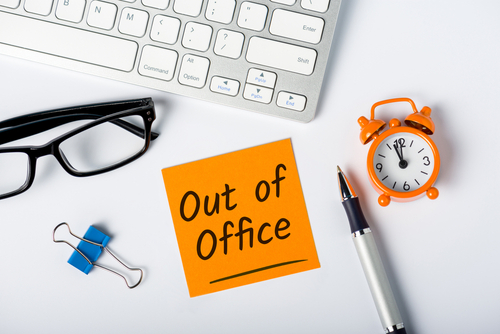Although we all look forward to taking our well-earned vacation time, in reality, taking time off isn’t always easy. In our fast-paced, interconnected world where work can follow you on your smartphone, or even smartwatch, everywhere you go, it can be hard to truly unplug and relax. But balancing your work and home life is essential for personal wellness and keeps you from burning out. These strategies can help you disconnect and stress less knowing that your workplace can handle a few days without you.
1. Define what are and aren’t emergencies.
In every field, sometimes there are unforeseeable crises. However, these issues can often be handled by other members of your staff if you are out—or can wait for you to get back. Before you take off, be clear with your manager and team about what constitutes a true emergency.
It may help to organize a meeting with your team to set a plan of action for these cases. In the meeting, try to anticipate potential emergencies that may come up and how they should be handled. Be sure to specify how you would like to be reached in those situations, as well. For instance, would you prefer a text to your personal phone, or will you have your work cell on hand for emergencies? Everyone values their vacation time, so people are often more understanding about a slightly longer response time than you think.
2. Declutter your inbox and set expectations with out-of-office and status messages.
If you don’t take the time to get organized before signing off for your vacation, it will only add to the stress you feel when you sign back on. Take a bit of time in the days or weeks prior to clean out your inbox and change your filter and alert settings to make sure the most important e-mails make their way to the top and won’t be missed when you return.
You should also set a clear out-of-office message for your inbox, phone, and any other communication platforms, such as Slack or Google Chat. There are many resources that outline best practices—for instance, don’t apologize or over-promise. Just specify the dates you will be gone, and direct people to a colleague they can reach out to in your stead.
3. Hold the boundaries you set.
Once you’ve set these boundaries, it’s important you hold yourself and others to them. If you tell your team you will be checking messages every other evening, for example, then stick to it and don’t work outside of those times.
Violating your own boundaries creates a mixed message that may end up confusing your team members and frustrating you. Remember that you have prepared your team to be self-sufficient and know how to keep things moving without you. The work will be there when you get back, and by keeping your boundaries, you can enjoy your time away and return to the office more refreshed.
4. Ease back in with a catch-up day.
It can be hard to immediately flip the switch from vacation mode back to work mode. Be realistic, and give yourself time to catch up on anything you’ve missed. You can block off time on your calendar to avoid getting packed with meetings on your first day back. Once you’ve made your way through your inbox and gotten back up to speed on any ongoing projects, schedule one-on-ones with team members to make sure you are on the same page and ready to tackle your tasks with a renewed energy after a restful break.
5. Recognize the benefits for you and your team.
Even for team members who aren’t taking vacation, your time off can be a valuable learning experience. Especially if you are in a leadership position, being out gives others on your team a chance to rise to the occasion. Empowering employees to trust their judgment helps them develop their problem-solving skills and gives you insight into your team’s strengths and weaknesses. It can even act as a practice run for a future promotion. If you cultivate trust among your team, then you can be confident in knowing they’ve got things covered.
Taking time off is never easy, but in reality, resting and recharging are crucial to your personal and professional fulfillment. Failing to truly log off leads to increased rates of burnout and creates more issues in the long run. Cultivating a work/life balance helps you perform better in all aspects of your life. These strategies can help you minimize the pressure to stay plugged in and make the most of your out-of-office time this year.
Jessica Gross is a marketing leader with over 10 years of experience in marketing strategy, customer research, writing, and project management. As a director of marketing at Aquent, Gross leads brand strategy and marketing communications initiatives, including positioning and messaging, website and blog content, and marketing campaigns.

